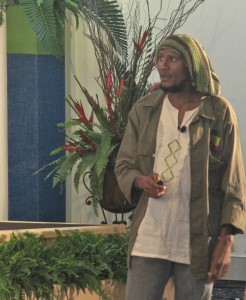
Social Enterprise: A Solution to the Inequality Dilemma?
January 27th, 2015
There were plenty of questions – and some answers – at the Jamaica Pegasus Hotel today (January 26), the first day of the very first Social Enterprise Summit. The Summit is a collaboration of the JN Foundation and the United States Agency for International Development (USAID) stemming from its three-year Social Enterprise Boost Initiative (SEBI), launched in 2013.
Yes, we need another day with the experts, and with the Jamaicans who gathered today. The room was full, by the way, and it is a large room. For a start (and you may be asking this question): What is Social Enterprise? There were one or two attempts to define the term. One of the guest speakers, Peter Holbrook, the CEO of Social Enterprise UK, was quite clear about what is the accepted definition in the UK and Europe: “A business that trades for a primary social purpose and that reinvests a majority of its profits to achieve its social goals.” A social enterprise does not have shareholders. “We will work towards a Jamaican definition,” said JN Foundation Chair Earl Jarrett in his introductory comments.
Minister of Industry, Investment and Commerce warmly embraced the concept in his speech. So did USAID Director Denise Herbol, who bravely climbed on stage with a “new knee, courtesy of wonderful Jamaican doctors.” Minister Hylton sensed the “optimism and energy” of the meeting, while recognizing that many social enterprises face similar challenges to those of small and medium-sized enterprises (SMEs). In terms of Government initiatives, he noted the launch on January 23 of a Small Business Development Centre (SBDC) model in Jamaica through the Organization of American States (OAS) and a new Mobile Business Clinic that will arrive in Savannah-la-Mar tomorrow. He suggested that social enterprises “look beyond the local” and form international partnerships to market and sell their products; there are undoubtedly a myriad opportunities here in the age of technology and the Internet.

The Private Sector Organization of Jamaica’s Executive Director Dennis Chung found the Network of Women’s mushrooms quite delicious at the SEBI Marketplace, by the way.
The Summit was by no means all talk. The adjoining room was packed (and the climate was, accordingly, considerably warmer). This was the very impressive and exciting SEBI Marketplace, where seventeen booths displayed the products of Jamaican organizations. There was the Alpha Boys’ School, with its range of cool designer T Shirts; the Network of Women for Food Security (NOW) in Spaldings, Manchester, who are currently working on an ambitious mushroom-growing project; Superior Crafts and More (the wonderful wickerwork made by visually impaired Jamaicans); the Daughters of Indigo, a natural dye collective in the hills of St. Thomas; and The Source in Savanna-la-Mar, Westmoreland, one of five community-based resource centers run by the JN Foundation and designed as “social franchises.” These are just a few examples from this vibrant group of enterprises.
So, what is the nature of social enterprise? What are the key elements? There was much discussion around the perceived dichotomy between the act of “doing good,” and running a successful small business. Is it welfare or wealth creation? “Isn’t there a tension between the two?” asked moderator Ian Boyne during the afternoon discussion. Presenters were answering participants’ questions, one of which was “Why not build the business first, and then do the social stuff?” (No, you cannot do it that way around, the panelists asserted). Dr. K’adamawe K’nife, Lecturer at the Mona School of Business and Management, did not buy into the traditionally idealistic volunteerism ethos of many non-governmental organizations, pointing out that social enterprise should be “driven and sustained by profit.” But Becca Stevens, founder of Thistle Farms in Nashville, Tennessee stressed, “The concept of love introduces everything else.”

Becca Stevens says you can build a social enterprise on a platform of love. Social justice must also be in the mix.
But then, social entrepreneur Dr. Henley Morgan ventured to ask Stevens, “How do you separate love from charity?” The analogy of giving a man a fish or teaching him to fish comes to mind. Stevens (who is an Episcopal priest and was recently named 2014 Humanitarian of the Year by the Small Business Council of America) countered, “I’m not sure, but they cannot be separated from the word justice.” How can you teach a man (or woman) to fish when he/she doesn’t even have a fishing rod?
Which brings us right back, in a sense, to the issue of inequality. Stevens used the word “justice” several times. The speakers from Social Enterprise UK (a huge national organization) referred to their work as “an ethical revolution,” empowering the most marginalized in society – the homeless, the unemployed, recovering addicts, people with disabilities. The social enterprise movement in the UK, they added proudly, has become “much more diverse,” benefiting disadvantaged minorities. Social Enterprise UK’s Chair Claire Dove also heads Liverpool’s Blackburne House Group, which has recently worked with women asylum seekers. Social Enterprise UK established a relationship with the Bangladeshi Nobel Prize winner Mohammed Yunis of Grameen Bank. When asked what was the most important aspect of his pioneering work, Yunis said simply, “Giving micro-loans to women” – in many parts of the world, highly marginalized also.

Peter Holbrooke of Social Enterprise UK says he spends a lot of time these days persuading politicians to buy into social enterprise initiatives and support them.
So, social enterprise may be seen as an attempt to redress that unequal balance. Inequality, that huge gap between the “haves” and the “have nots,” has emerged as a pressing issue in both developed and developing countries. The world’s rich and famous recently flew into Davos in their private jets, despite expressed concerns over climate change for the World Economic Forum (WEF). The WEF Global Risks Landscape 2013 – a survey of its multi-stakeholder communities – has the income gap high on its list of concerns. The 2014 report also places “severe income disparity” (which includes “persisting” gender inequalities) at Number Four in its top ten of Major Things to Worry About. And this despite economic improvements in Asia, Africa and even parts of Latin America (and our hemisphere has the highest levels of income inequality in the world, by the way).

Participants listened intently to all the speakers and were at times quite vocal and energetic in their responses.
“The relationship between business and society has broken down,” one speaker observed. Multinationals have gobbled up many small firms over the years; firms that were more connected to…people. Perhaps the growing interest in social enterprise (which is really nothing new, although the term may be new to some of us) is a reaction to this.
In their 1971 tribute to the historic Woodstock music festival, Crosby Stills & Nash sang, “We are stardust/We are golden/And it’s time to get ourselves back to the garden.” Yes, a hippie anthem. Dr. K’nife referred somewhat ironically to the hippy movement’s philosophy of creating an independent, self-sufficient, more caring society. I wonder. Can Jamaica – can the world – get back to that garden? And at the same time, create wealth for the many, not just for that one percent we speak of these days?
As Becca Stevens pointed out firmly, “In the end, you want to take up shelf space.” You want to be out there, selling your product, creating jobs, supporting those who need support. It’s not airy-fairy stuff, all agreed.
But the belief was there:“You should be hopeful about the work that you do.”
Tomorrow, the Social Enterprise Summit will tackle the nuts and bolts of social enterprise. We look forward to it.

And did I mention that members of the Alpha Boys’ Band played for us? I for one wished their performance had been longer.
Tags: Alpha Boys' School, Becca Stevens, Claire Dove, Daughters of Indigo, Denise Herbol, Earl Jarrett, entrepreneurs, income disparity, Jamaica, JN Foundation, K'adamawe K'nife, Mona School of Business and Management, Network of Women for Food Security, NGO, Peter Holbrook, Savanna-la-Mar, small and medium-sized enterprises, Small Business Development Centre, social enterprise, Social Enterprise Boost Initiative, Social Enterprise Summit, Social Enterprise UK, Superior Crafts and More, The Source, Thistle Farms, USAID, volunteerism, World Economic Forum
The Gleaner reserves the right not to publish comments that may be deemed libelous, derogatory or indecent.
To respond to The Gleaner please use the feedback form.
6 Responses to “Social Enterprise: A Solution to the Inequality Dilemma?”
- We Are the Zoomers
- Living Online with Humans and Birds: NAOC 2020
- Human Trafficking and the Problem of Public Education
- Down Memory Lane
- Are We Ready to Recover from COVID-19?
- Road Safety Matters: Is Your Vehicle Safe?
- Sexual Harassment, Me Too, and the Minister’s Disturbing Giggle
- The Vulnerable Senior Citizens, Private Care Homes and COVID-19
- A Muddle Over Masks
- Here is Something Life-Saving You Can Do: Give Blood!




Nice summary. I wondered about pre event publicity. Am I sitting in the wrong places to see or know of such events? (I ask in part because I got a flier about another conference a day after it ended.)
Not sure one needs to load reducing inequality onto SE shoulders. It gives opportunities that are new but it’s not clear how it sits completely because we don’t see what else is going on around the activity of SEs.
Talking about small firms being gobbled ip by multinational firms misses a basic point. Firms are always merging, including being bought out, and small firms get swallowed by bigger firms all along the chain. It’s simplistic to see big bad multinational wolves.
Thanks for sharing.
Very well written article. It is always great to here about Jamaica’s budding social enterprise movement. Pretty soon Jamaica will be making a global impact. I will be following this very closely.
The Summit was a great success due in large part to the great input and involvement of the participants. SE’s come out of civil society, and they are often the voice of reason.
You are quite right, Saffrey! The participants were enthusiastic and incredibly focused. This became clear from the Q&A sessions. The voice of reason, yes… A more balanced and holistic perspective, I think. Thank you for your comments!
Thank you so much, Warren. I think this initiative is well worth watching. Kudos to USAID for its support, too.
I’m not sure about pre-event publicity, but I do know that the event was extremely well attended (oh by the way I also get such information at very short notice, sometimes!) I was asked to attend because I am a JN Foundation volunteer (proudly!) and live tweeted from their last major event. So it was a pleasure to be back in the social media hub! As for your comments on SEs, in Jamaica at least they are so closely tied to the communities in which they work. Why is the merging/buying of small companies simplistic? I don’t quite understand. Thanks so much for your comments, Dennis!